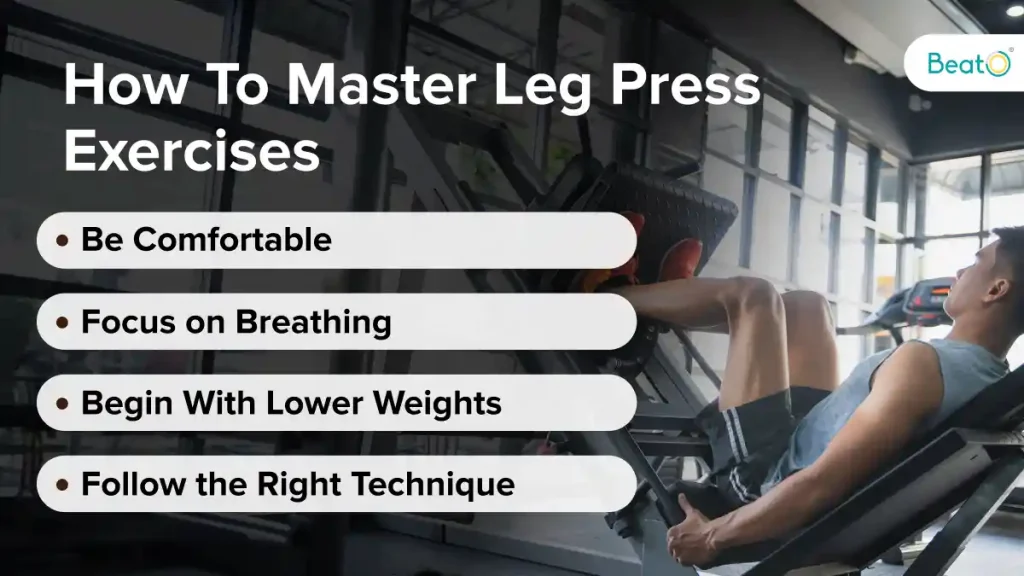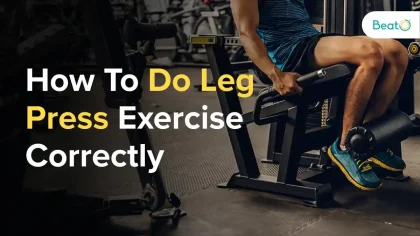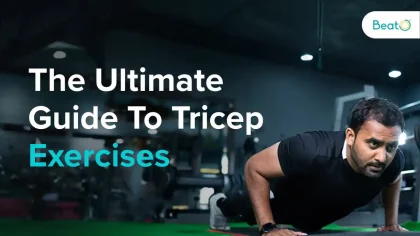In the journey of Yoga and easy exercises, let us move forward to the next level where you can use some basic machines and equipment that will be effective for some specific parts of your body. We are here talking about Leg Press.

Leg presses are a weight training exercise that works on the lower body’s quadriceps, hamstrings, and gluteal muscles. Using your legs, you can push a weighted platform away from you on a leg press machine to accomplish the exercise. One leg at a time to concentrate on each leg separately, or two legs simultaneously, can be used for the leg press.
The exercise is frequently aimed at strengthening the legs because it is thought to be effective in building muscle in the lower body. Since it lowers the chance of back and knee injuries, it is typically considered safer than workouts like squats. Here in this article, we will learn deeply about leg press exercises, how to do them, who should avoid them and finally what are its benefits.
Also Read: Comprehensive Guide To Paschimottanasana Benefits, Proper Technique & Precautions
What are Leg Press Exercises?
A common strength training exercise, the leg press targets the lower body’s muscles, especially the quadriceps, hamstrings, and glutes. Leg press machines, which usually consist of a platform with the feet placed on it and a seat that glides on rails, are used to do the exercise.
A leg press machine typically comes in two varieties: the normal horizontal leg press and the inclined leg press, which has an inclined seat that reclines to a 45-degree angle. You must sit at an angle and press your legs upward diagonally to perform the inclined leg press. The leg press is frequently used in conjunction with squats, which target the same muscle groups but differently, to produce a well-rounded leg workout.
A collection of four muscles at the front of the thigh are called the quadriceps, or “quads.” One of the main movements in the leg press exercise is stretching the knee joint, which is accomplished by these muscles. When you straighten your legs against the weight’s resistance during the pressing part of the workout, your quadriceps muscles are actively used.
Three muscles in the back of the thigh are called the hamstrings. They are in charge of stretching the hip joint and flexing the knee joint. The hamstrings serve as stabilizers and help you control the weight’s descent as you lower the platform back towards your body during the leg press exercise.
Also Read: Elevate Your Daily Routine with These Facial Stretches
How to do leg exercises correctly?

When performing the leg press exercises, the worst error one can make is not taking the machine seriously. Without perfecting your form, you cannot just sit down in the rig and expect to perform well. To start, visualize the leg press as a squat performed from a different stance, then focus on form.
Follow these steps properly while performing the leg press exercises:
Be Comfortable
Sit comfortably in the leg press machine with your back and head leaning against the pads. Place your feet flat on the footplate, hip-width apart, and point your toes up. Make sure you’re sitting in a way that lets your legs bend at a right angle when your feet are on the footplate. If you place your feet too high or too low, it can strain your bottom or knees. Keep your knees directly above your feet and don’t let them sway to the sides.
Focus on Breathing
Remember to breathe properly while working out. Push the footplate away as you breathe out and pull it closer as you breathe in. Squeeze your bottom and thigh muscles when you push, and don’t move your upper body around.
Go Slow
When your legs are fully stretched out, take a small pause. Make sure not to straighten your knees completely or let them wiggle to the sides. Breathe in and slowly bring the footplate back to where you started by bending your knees. Keep your feet flat and your back against the pad the whole time.
Also Read:The Healing Power of Chair Restorative Yoga | A Complete Guide
Follow the Right Technique
Push the footplate away using the whole foot, not just the toes, and keep your belly muscles tight. Don’t lift your heels off the plate. Push slowly and carefully, not with a sudden jerk.
To prevent damage, it’s critical to keep the right form throughout the workout. Don’t arch your back; instead, make sure it stays firmly against the seat. Moreover, avoid allowing your knees to flare outward or inward and instead maintain them in line with your feet. Depending on your objectives and degree of strength, change the machine’s weight.
As with any exercise, begin with lower weights and work your way up to a higher level as you gain comfort and proficiency. You can also try pressing the footplate with one leg at a time. Just be sure to lighten the weight before you do, and switch legs to work them both out equally.
Also Read: 10 Health Benefits of Walking Everyday
Benefits of doing Leg Press Exercises Regularly
- Many muscles, including the quadriceps, hamstrings, and gluteal muscles, are developed and strengthened by leg presses. The calf muscles get stronger since they are essential in supporting these other muscles.
- You can train your legs with large loads by using the leg press. You will be able to work with larger numbers or reps than in free-weight motions.
- Before progressing to more difficult leg exercises, novices may find that the leg press provides a steady base for strengthening their lower body. It increases endurance and flexibility while strengthening and molding your hamstring muscles.
- By enhancing the strength of the muscles required for advancement, strengthening your quadriceps with leg press exercises further can improve your squat performance.
- With its ability to support the back and neck, the leg press machine is a safer alternative for people with lower back pain or those new to strength training as compared to free weight exercises like squats and lunges.
Incorporating the leg press exercise into a comprehensive training position helps enhance general fitness, muscle growth, and lower body strength. To optimize the benefits and lower the risk of injury, the exercise must be performed with the correct form and technique.
Also Read: Recommended Breathing Exercises for People With Diabetes
Risks and Precautions
The leg press exercises are a great workout but be careful to avoid these common risks and take precautions:
- Don’t arch your back or go too heavy on the weight; it can hurt your lower back. Keep your back pressed against the seat.
- Don’t let your knees go too far over your toes or place your feet too high or low on the platform; it could strain your knees. Keep your knees above your feet and don’t straighten them completely.
- If your hips are usually tight, doing some warm-up moves for your hip area before the leg press can help you avoid hip pain.
- Don’t do leg presses too often or with too many reps; it can tire out your muscles and joints. Rest between leg workouts and switch up your routine.
- Putting your feet in the wrong spot can mess up the exercise and hurt you. Keep your feet shoulder-width apart, flat on the platform, and point your toes a bit outward.
- Don’t let the weight slam down when you’re lowering it; it’s bad for your knees. Lower the weight slowly and with control.
- If you have health issues or aren’t sure about your workout, talk to a doctor or a fitness pro before starting the leg press.
By doing the leg press the right way and being careful, you can make your lower body stronger and more muscular without getting hurt.
Also Read: Unveil the Healing Power: The Ultimate Guide to Surya Namaskar
Who should avoid leg press exercises?
If you have weak muscles in your lower belly area, skip the leg press because it’s tough on that part. Also, if your knee is hurt, don’t use this machine — listen to your doctor or fitness trainer for easier leg exercises.
If your knees hurt when you’re doing the leg press, stop right away. Ignoring the pain could make things worse. And if you’ve got a bad back or back pain, it’s best to avoid this exercise too.
Also Read: Manage Your Fitness With The Perfect Blend of Exercise & Supplements
Conclusion
To wrap it up, getting good at the leg press can power up your legs and boost your overall health. It works out the main leg muscles like the front thigh muscles, back thigh muscles, and your butt, making you stronger, more stable, and better at sports. But be careful, you’ve got to do it right to not hurt your back or knees. Stick with it, pick the right amount of weight, and always play it safe, and the leg press can be a great part of your workout.
Disclaimer: The content of this article is compiled information from generic and public sources. It is in no way a substitute, suggestion, or advice for a qualified medical opinion. Always consult a specialist or your own doctor for more information. Beato App does not claim responsibility for this information.
Are you looking for the perfect glucometer to check your blood sugar level? Try out BeatO smartglucometerkit, affordable and easy to use.
Discover top-tier diabetes care with BeatO’s Chief Clinical Officer,Dr. Navneet Agarwal. His expertise in Diabetes ensures personalised guidance for overall health. Try out a smartglucometerand keep track of blood sugar levels now.




